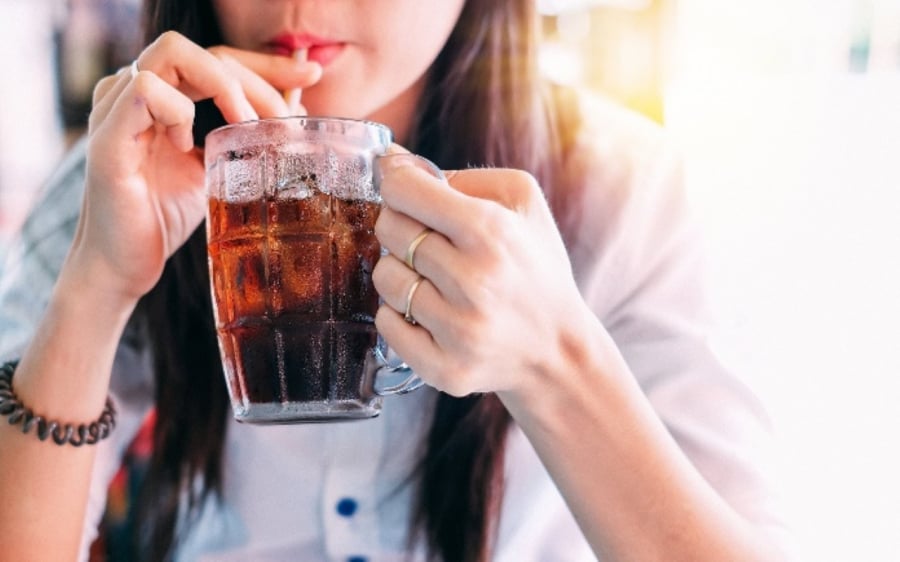The Dark Side of 5 Seemingly Innocent Drinks: Are You Unknowingly Harming Your Health?
1. Carbonated Soft Drinks
Carbonated soft drinks have long been a popular choice, especially during hot summer days. However, behind that sweet, refreshing taste lies a hidden “bomb” of sodium, quietly wreaking havoc on your health. Each 330ml can of soda contains anywhere between 40 to 60mg of sodium, a significant amount considering the daily recommended intake.
The regular consumption of these drinks not only stresses your kidneys but also increases the risk of cardiovascular diseases, high blood pressure, and even heart failure. Moreover, the high sugar content is a leading cause of obesity, type 2 diabetes, and other severe health issues.

Carbonated soft drinks: A hidden “bomb” of sodium
2. Energy Drinks
Energy drinks are becoming increasingly popular, especially among teenagers and young adults with busy lifestyles. However, they are potentially one of the most harmful beverages for kidney health. With high caffeine, sugar, and sodium content (up to 100mg of sodium in a 330ml can), energy drinks place a significant burden on the body’s filtration system.
The caffeine in these drinks can lead to negative effects such as insomnia, rapid heart rate, anxiety, and high blood pressure. Additionally, the fructose and high sodium content can cause liver damage and further increase the risk of obesity and diabetes.
3. Canned Fruit Juices
Many people consider canned fruit juices as a healthier alternative to soft drinks. Unfortunately, this is not entirely true. Most canned juice products contain alarming levels of sugar and sodium. A single glass of canned fruit juice can have up to 80mg of sodium, equivalent to a quarter of the daily recommended intake.
To protect your kidney health, opt for fresh, homemade fruit juices or choose canned options that are unsweetened and low in sodium. This will reduce the burden on your kidneys and ensure your body receives the natural nutrients from the fruit.
4. Flavored Milk
Flavored milk, such as chocolate or strawberry milk, is often perceived as a nutritious drink, especially among children and teenagers. However, to achieve those appealing flavors, manufacturers add significant amounts of sugar and sodium. A cup (240ml) of flavored milk can contain anywhere from 100 to 150mg of sodium, which is concerning.
Instead, opt for plain milk or low-fat milk. These options still provide the same essential calcium and nutrients without putting extra stress on your kidneys.
5. Sports Drinks
Sports drinks are specifically designed to replenish fluids and electrolytes lost during intense athletic activities. However, for individuals who are not highly active, the regular consumption of these drinks can lead to excessive sodium intake. A single 500ml bottle of a sports drink can contain up to 200mg of sodium, which is considerable and can strain the kidneys.
Safeguarding Your Kidney Health: 5 Practical Tips
– Minimize consumption of carbonated soft drinks and energy drinks.
– Prioritize drinking water or natural mineral water.
– Choose fresh, homemade fruit juices over canned options.
– Opt for plain milk or low-fat milk instead of flavored milk.
– Reserve sports drinks for occasions when you genuinely need to replenish electrolytes after intense workouts.
Remember, while these drinks may seem harmless, their regular consumption can have detrimental effects on your health, especially your kidneys. Making smarter choices will help protect your kidney function and overall well-being.
The Ultimate Superfood: A Powerful Cancer-Fighting Vegetable Hiding in Plain Sight
“In Vietnam, there is a humble vegetable that is both easy to cultivate and delicious to consume. With a price tag of just a few thousand dong, this vegetable is a powerful ally in the fight against cancer. Unfortunately, many people are unaware of its incredible benefits. This unassuming hero is a true ‘superfood’ in disguise.”
Those Who Should Avoid Eating Durian
“Durian is an acquired taste; an exotic and divisive fruit that evokes strong reactions. With its unique flavor and pungent aroma, this king of fruits has a devoted following among those who appreciate its creamy, rich texture and bold, complex taste. However, its strong odor and unusual appearance can be off-putting to some, making it a love-it-or-hate-it delicacy.”
Is Your Sleep Position Raising Blood Sugar? A 100,000-Person Study Reveals a Surprising Truth.
A groundbreaking large-scale study involving over 100,000 participants has revealed an unexpected link between sleep posture and blood sugar fluctuations, which directly impact cardiovascular health, metabolism, and diabetes risk. Are you sleeping your way to health? It’s time to uncover the surprising connection between your sleep posture and overall wellness.


































